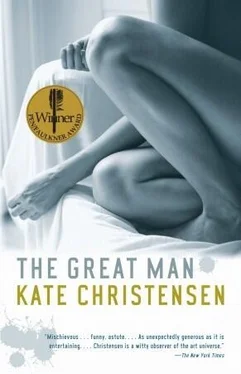She took another spoonful of soup and settled more comfortably in her chair, which had padding on the seat, the sort of luxury Michael and Natalie would naturally have, even on chairs they’d rented.
“There she is!” Michael said, looking at someone coming through the front door.
“It’s Paula Jabar,” John crooned under his breath to Maxine, turning to see. “I’ve never met her.”
Maxine hunched over her cooling soup.
“I am so sorry, ” came Paula’s voice, which managed to be both loud and velvety at the same time. “I got held up. Where’s Natalie? Hey there, girl! You’re looking good. ”
She passed by Maxine in a cloud of flowery smells, something ghetto and feminine, undulating dreadlocks, a dress made of a shimmery tropical bird — colored material, cut to reveal just enough luscious thirty-five-year-old café au lait skin, heavy on the lait.
The soup bowls were whisked away and plates of summery salad replaced them: a Japanese woodcut sea of curly pale green frisee lettuce on which floated almond slice rafts, each holding a tiny, near-translucent poached baby shrimp as pink and naked as a newborn. Crisp blanched haricots verts darted through the sea like needle-nosed fish. Cerise-rimmed radish slices bobbed here and there like sea foam. The dressing was a briny green lime juice and olive oil emulsion. Maxine stared at the thing, trying to imagine the person who had so painstakingly made it. It would be demolished in three bites. She would have been perfectly happy with a wedge of iceberg with a glop of bottled Russian dressing, like you got in the olden days. Food had become so fussy and contrived.
Paula took her place between Jane and Michael with a quick sidelong comment to Jane that made Jane laugh and lean over and give her a kiss on the cheek. How did they know each other well enough for that? As Maxine munched a big forkful of the fussy, preposterous salad, Michael performed the requisite hostly introductions so that everyone at the table could know beyond any doubt that Paula Jabar had just landed in their midst. The waiters came around and refilled wineglasses with a feathery-light, crisp white wine — Maxine had no idea what, but on top of her glass of whiskey, it was making this whole thing infinitely more tolerable, especially now that the easy warmth she’d felt at the table was now revealed to be as fugitive as all unexpected intimacies.
“Hey, how have you been, Maxine?” Paula asked suddenly.
Maxine set her salad fork down and gave her the fish eye. “Very well, Paula, and you?”
“Working, working. Sometimes I think that’s all I do.” Paula tossed a handful of dreadlocks over one bare shoulder. Maxine looked somewhat curiously into her eyes, which were impenetrable, as if they’d been spray-coated with something shiny and tough.
“How is your work going?” John asked tentatively, as if it might be construed as rude to inquire.
Paula’s face gave away nothing. “Today not at all, ’cause I had these people, asking questions.”
“What are you working on now?” Jane asked.
Paula had made a career out of making small dioramas, the shoe-box worlds children made in grade school — or rather, used to make, back when children did such things. Her best-known one was Beautiful Day in the Hood, which showed a woman in a project apartment cowering with her daughters on a couch as gang-warfare gunfire raged outside; the gunfire was represented by “Pow!” and “Ak-ak-ak-ak-ak!” coming out of the windows in a dialogue bubble rimmed with fiery orange and red. And so forth. Paula Jabar was about as famous as you could get in the art world these days. Four of her “ghetto boxes” had been shown in the previous year’s Whitney Biennial; she had even made an appearance on Oprah.
Maxine happened to know, because she’d read an interview with Paula a number of years ago, back when Paula was less savvy about marketing herself and more unguarded about the truth of her past — that after the age of five, Paula’s childhood had taken place miles from anything resembling a ghetto. Moreover, her white maternal grandparents had moved to the States from France, and her father was a lawyer from Algeria. Paula had, it was true, been born in a scruffy neighborhood; her parents hadn’t had much money then, because her father was still in law school, while her mother supported them as a high school French teacher, but once he had passed the bar and joined a law firm, the Jabars had bought a house in a tony suburb and Paula’s mother had quit her job; the three kids were sent to private schools, and Paula later studied art at Bennington. She had been more naïvely candid in that long-ago interview, but these days, being much smarter about her career and image, Paula allowed her interviewers to gather that she’d grown up on the South Side of Chicago and had gone through some hard times.
Fortunately for her, even if the truth had come out, it was considered poor manners to question anyone’s racial authenticity. She could have countered any untoward skepticism with the line she’d used in that interview: “There’s a saying among Jewish people when their racial purity is called into question by their fellow Jews: ‘I’m Jewish enough for the ovens.’ Well, I’m black enough for slavery.”
Maxine looked over at Jane, who was avidly awaiting Paula’s answer about those damned dioramas. When had Jane become so enamored of Paula, and, more important, why? Paula was exactly the sort of person Jane and Maxine might have made fun of privately together back in the old days. Either Jane had lost her sense or Maxine was completely out of touch; Maxine was unwilling to investigate the likelihood of the former.
“I’m doing a new series. Michael knows,” Paula added, nudging him.
“It’s brilliant,” said Michael briefly, not looking at Paula, with his manner suggesting a fleeting but marked self-consciousness Maxine had never observed in him before.
Were they sleeping together? Were they? Maxine thought of herself as impossible to shock, but for some reason, this truly surprised her. It seemed unlike Paula somehow to sleep with her dealer, no matter how appealing and successful he was, and Maxine would have bet that although Michael’s appetites would eventually lead him to adultery and excess, he was still on the right side of things; his conscience and ego seemed approachably cloudless. No, of course they weren’t sleeping together. But their relationship seemed sticky and intertwined nonetheless.
“What’s the new series?” Maxine asked Paula, wishing she could shoot a privately amused, colluding look over at Jane and have Jane return it, as she would have a long time ago. Instead, Jane turned her gaze toward Paula to await her answer.
“I’m building replicas of certain, quote/unquote, clichés of African American family life,” said Paula. Michael didn’t look at her as she spoke; he looked thoughtfully into his wineglass. “Life-size. The miniaturizations of the boxes were greatly effective but have run their course. I’m fabricating a couch in an apartment in the projects, family watching TV, no father; a Kentucky Fried Chicken booth with a family eating dinner, no father; a car of the A train heading up to Harlem, whole family coming home from shopping, no father. Like that. My visitors today were from MOMA, of all places. It would be a real statement to get a replica of a KFC booth into the Museum of Modern Art.”
“Was that what they were interested in?” Michael asked.
“Well, they liked the A train, too….” She held up her fingers, which were theatrically crossed.
“How would you characterize what you’re doing?” Maxine asked. Her voice resounded with a certain hollowness, but no one seemed to notice.
Читать дальше












